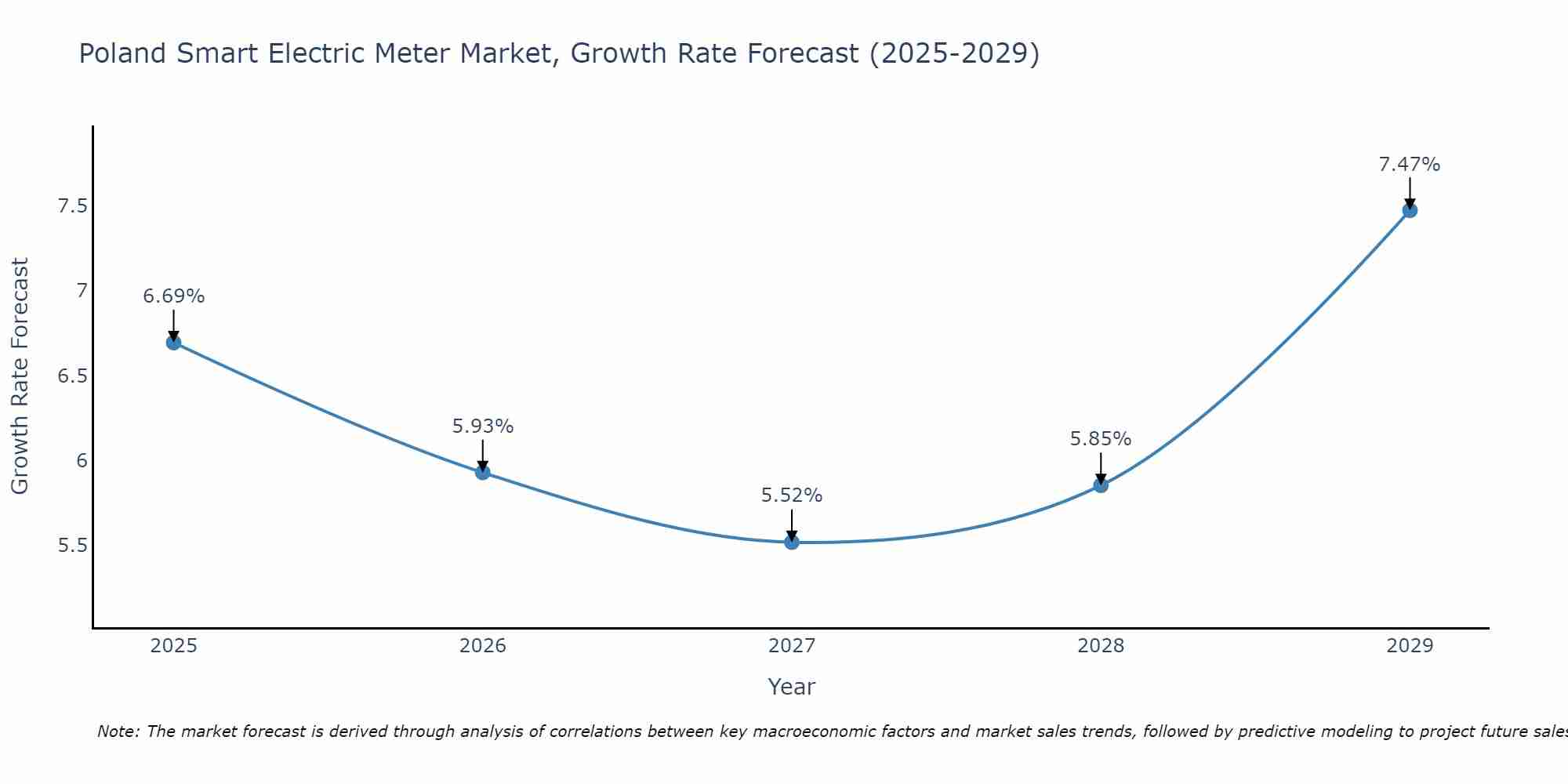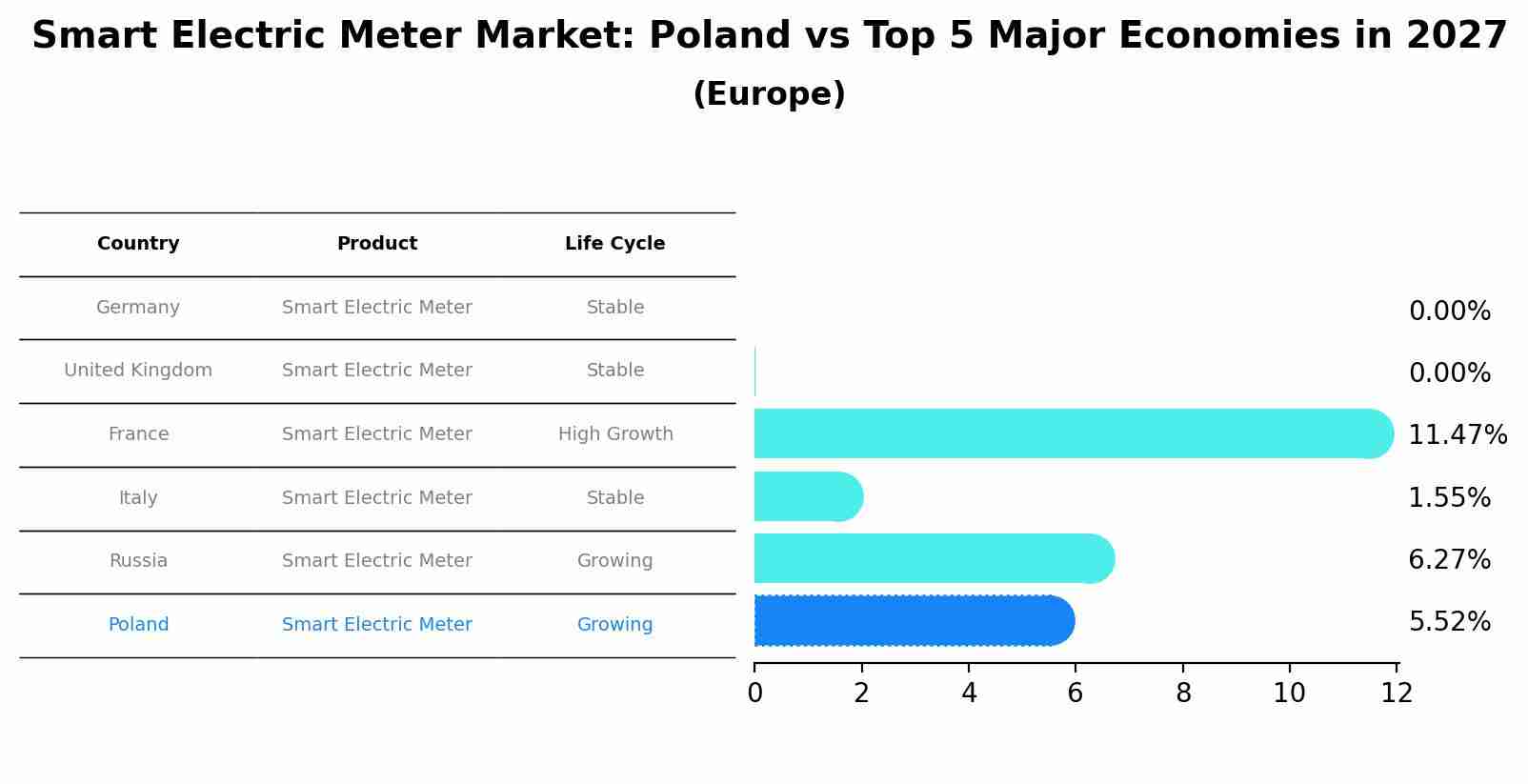Poland Smart Electric Meter Market (2025-2031) Outlook | Analysis, Trends, Growth, Value, Forecast, Size, Industry, Companies, Share & Revenue
| Product Code: ETC369315 | Publication Date: Aug 2022 | Updated Date: Jul 2025 | Product Type: Market Research Report | |
| Publisher: 6Wresearch | Author: Shubham Padhi | No. of Pages: 75 | No. of Figures: 35 | No. of Tables: 20 |
Poland Smart Electric Meter Market Size Growth Rate
The Poland Smart Electric Meter Market is projected to witness mixed growth rate patterns during 2025 to 2029. Commencing at 6.69% in 2025, growth builds up to 7.47% by 2029.

Smart Electric Meter Market: Poland vs Top 5 Major Economies in 2027 (Europe)
The Smart Electric Meter market in Poland is projected to grow at a growing growth rate of 5.52% by 2027, within the Europe region led by Germany, along with other countries like United Kingdom, France, Italy and Russia, collectively shaping a dynamic and evolving market environment driven by innovation and increasing adoption of emerging technologies.

Poland Smart Electric Meter Market Synopsis
The Poland Smart Electric Meter Market is witnessing significant growth driven by government initiatives promoting smart grid infrastructure and increasing focus on energy efficiency. Smart meters enable real-time monitoring of energy consumption, leading to better resource management and cost savings for consumers. Key players in the market are investing in technological advancements to provide advanced features like remote monitoring, energy usage analytics, and integration with smart home systems. The market is also benefiting from increasing awareness among consumers regarding the benefits of smart meters in reducing electricity bills and environmental impact. With a push towards digitalization and energy conservation, the Poland Smart Electric Meter Market is expected to continue its growth trajectory in the coming years.
Poland Smart Electric Meter Market Trends
The Poland Smart Electric Meter Market is witnessing a growing adoption of advanced metering infrastructure (AMI) systems due to government initiatives promoting energy efficiency and grid modernization. Smart meters are increasingly being deployed by utility companies to enable real-time monitoring, remote data collection, and improved energy management for consumers. The market is also experiencing a shift towards digitalization and integration of smart meters with smart grid technologies for optimized energy distribution and consumption. Furthermore, the demand for smart electric meters is driven by the increasing focus on renewable energy integration and the need for accurate billing and data analytics. Overall, the Poland Smart Electric Meter Market is expected to continue growing as utilities seek to enhance operational efficiency and meet sustainability goals.
Poland Smart Electric Meter Market Challenges
In the Poland Smart Electric Meter Market, challenges include regulatory complexities related to implementing advanced metering infrastructure, such as data privacy regulations and compliance requirements. Additionally, the high initial cost of deploying smart meters coupled with the need for significant investment in infrastructure upgrades poses a financial challenge for utilities and energy providers. Interoperability issues among different metering systems and communication protocols also hinder seamless integration and data exchange. Moreover, consumer awareness and acceptance of smart meters remain a hurdle, as some individuals may have concerns about data security and privacy issues. Overall, overcoming these challenges will require collaboration among stakeholders, effective communication strategies, and robust cybersecurity measures to ensure successful deployment and adoption of smart electric meters in Poland.
Poland Smart Electric Meter Market Investment Opportunities
In the Poland Smart Electric Meter Market, there are promising investment opportunities due to the increasing adoption of smart grid technologies and the government`s initiatives to modernize the country`s energy infrastructure. Investing in companies that manufacture or provide smart electric meters, software solutions for data management and analytics, and communication technologies for smart grid systems could be lucrative. Additionally, opportunities exist in offering consulting services for utilities looking to implement smart metering solutions efficiently. With the EU`s directives on energy efficiency and sustainability driving the demand for smart meters, investing in the Poland Smart Electric Meter Market could provide long-term returns as the country transitions towards a more advanced and efficient energy system.
Jordan Agar Market Government Policies
The Polish government has implemented policies to promote the adoption of smart electric meters, aiming to enhance energy efficiency and facilitate the transition to a more sustainable energy system. The regulations require energy suppliers to offer smart meters to all customers by specific deadlines, with a focus on improving consumer awareness and empowerment through real-time energy usage data. Additionally, the government has introduced financial incentives and subsidies to encourage the installation of smart meters in residential and commercial buildings. These policies aim to drive innovation in the energy sector, reduce energy consumption, and enable more efficient grid management, ultimately contributing to Poland`s energy security and environmental goals.
Poland Smart Electric Meter Market Future Outlook
The future outlook for the Poland Smart Electric Meter Market looks promising, with significant growth anticipated in the coming years. Factors such as increasing energy efficiency initiatives, rising demand for smart grid technologies, and government regulations promoting the adoption of smart meters are expected to drive market expansion. The market is also likely to benefit from the growing focus on renewable energy integration and the need for advanced metering infrastructure. As smart meters offer benefits such as real-time data monitoring, improved energy management, and cost savings for consumers, the market is poised for steady growth. Overall, the Poland Smart Electric Meter Market is projected to experience robust growth as utilities and consumers embrace smart metering technologies to enhance energy efficiency and sustainability.
Key Highlights of the Report:
- Poland Smart Electric Meter Market Outlook
- Market Size of Poland Smart Electric Meter Market, 2024
- Forecast of Poland Smart Electric Meter Market, 2031
- Historical Data and Forecast of Poland Smart Electric Meter Revenues & Volume for the Period 2021 - 2031
- Poland Smart Electric Meter Market Trend Evolution
- Poland Smart Electric Meter Market Drivers and Challenges
- Poland Smart Electric Meter Price Trends
- Poland Smart Electric Meter Porter's Five Forces
- Poland Smart Electric Meter Industry Life Cycle
- Historical Data and Forecast of Poland Smart Electric Meter Market Revenues & Volume By Phase for the Period 2021 - 2031
- Historical Data and Forecast of Poland Smart Electric Meter Market Revenues & Volume By Single for the Period 2021 - 2031
- Historical Data and Forecast of Poland Smart Electric Meter Market Revenues & Volume By Three for the Period 2021 - 2031
- Historical Data and Forecast of Poland Smart Electric Meter Market Revenues & Volume By Communication Technology Type for the Period 2021 - 2031
- Historical Data and Forecast of Poland Smart Electric Meter Market Revenues & Volume By Power Line Communication (PLC) for the Period 2021 - 2031
- Historical Data and Forecast of Poland Smart Electric Meter Market Revenues & Volume By Radio Frequency (RF) for the Period 2021 - 2031
- Historical Data and Forecast of Poland Smart Electric Meter Market Revenues & Volume By Cellular for the Period 2021 - 2031
- Historical Data and Forecast of Poland Smart Electric Meter Market Revenues & Volume By End-Users for the Period 2021 - 2031
- Historical Data and Forecast of Poland Smart Electric Meter Market Revenues & Volume By Industrial for the Period 2021 - 2031
- Historical Data and Forecast of Poland Smart Electric Meter Market Revenues & Volume By Commercial for the Period 2021 - 2031
- Historical Data and Forecast of Poland Smart Electric Meter Market Revenues & Volume By Residential for the Period 2021 - 2031
- Poland Smart Electric Meter Import Export Trade Statistics
- Market Opportunity Assessment By Phase
- Market Opportunity Assessment By Communication Technology Type
- Market Opportunity Assessment By End-Users
- Poland Smart Electric Meter Top Companies Market Share
- Poland Smart Electric Meter Competitive Benchmarking By Technical and Operational Parameters
- Poland Smart Electric Meter Company Profiles
- Poland Smart Electric Meter Key Strategic Recommendations
Frequently Asked Questions About the Market Study (FAQs):
- Single User License$ 1,995
- Department License$ 2,400
- Site License$ 3,120
- Global License$ 3,795
Search
Related Reports
- ASEAN Bearings Market (2025-2031) | Strategy, Consumer Insights, Analysis, Investment Trends, Opportunities, Growth, Size, Share, Industry, Revenue, Segments, Value, Segmentation, Supply, Forecast, Restraints, Outlook, Competition, Drivers, Trends, Demand, Pricing Analysis, Competitive, Strategic Insights, Companies, Challenges
- Europe Flooring Market (2025-2031) | Outlook, Share, Industry, Trends, Forecast, Companies, Revenue, Size, Analysis, Growth & Value
- Saudi Arabia Manlift Market (2025-2031) | Outlook, Size, Growth, Trends, Companies, Industry, Revenue, Value, Share, Forecast & Analysis
- Uganda Excavator, Crane, and Wheel Loaders Market (2025-2031) | Strategy, Consumer Insights, Analysis, Investment Trends, Opportunities, Growth, Size, Share, Industry, Revenue, Segments, Value, Segmentation, Supply, Forecast, Restraints, Outlook, Competition, Drivers, Trends, Demand, Pricing Analysis, Competitive, Strategic Insights, Companies, Challenges
- Rwanda Excavator, Crane, and Wheel Loaders Market (2025-2031) | Strategy, Consumer Insights, Analysis, Investment Trends, Opportunities, Growth, Size, Share, Industry, Revenue, Segments, Value, Segmentation, Supply, Forecast, Restraints, Outlook, Competition, Drivers, Trends, Demand, Pricing Analysis, Competitive, Strategic Insights, Companies, Challenges
- Kenya Excavator, Crane, and Wheel Loaders Market (2025-2031) | Strategy, Consumer Insights, Analysis, Investment Trends, Opportunities, Growth, Size, Share, Industry, Revenue, Segments, Value, Segmentation, Supply, Forecast, Restraints, Outlook, Competition, Drivers, Trends, Demand, Pricing Analysis, Competitive, Strategic Insights, Companies, Challenges
- Angola Excavator, Crane, and Wheel Loaders Market (2025-2031) | Strategy, Consumer Insights, Analysis, Investment Trends, Opportunities, Growth, Size, Share, Industry, Revenue, Segments, Value, Segmentation, Supply, Forecast, Restraints, Outlook, Competition, Drivers, Trends, Demand, Pricing Analysis, Competitive, Strategic Insights, Companies, Challenges
- Israel Intelligent Transport System Market (2025-2031) | Strategy, Consumer Insights, Analysis, Investment Trends, Opportunities, Growth, Size, Share, Industry, Revenue, Segments, Value, Segmentation, Supply, Forecast, Restraints, Outlook, Competition, Drivers, Trends, Demand, Pricing Analysis, Competitive, Strategic Insights, Companies, Challenges
- Uganda Precast and Aggregate Market (2025-2031) | Strategy, Consumer Insights, Analysis, Investment Trends, Opportunities, Growth, Size, Share, Industry, Revenue, Segments, Value, Segmentation, Supply, Forecast, Restraints, Outlook, Competition, Drivers, Trends, Demand, Pricing Analysis, Competitive, Strategic Insights, Companies, Challenges
- Australia IT Asset Disposal Market (2025-2031) | Strategy, Consumer Insights, Analysis, Investment Trends, Opportunities, Growth, Size, Share, Industry, Revenue, Segments, Value, Segmentation, Supply, Forecast, Restraints, Outlook, Competition, Drivers, Trends, Demand, Pricing Analysis, Competitive, Strategic Insights, Companies, Challenges
Industry Events and Analyst Meet
Our Clients
Whitepaper
- Middle East & Africa Commercial Security Market Click here to view more.
- Middle East & Africa Fire Safety Systems & Equipment Market Click here to view more.
- GCC Drone Market Click here to view more.
- Middle East Lighting Fixture Market Click here to view more.
- GCC Physical & Perimeter Security Market Click here to view more.
6WResearch In News
- Doha a strategic location for EV manufacturing hub: IPA Qatar
- Demand for luxury TVs surging in the GCC, says Samsung
- Empowering Growth: The Thriving Journey of Bangladesh’s Cable Industry
- Demand for luxury TVs surging in the GCC, says Samsung
- Video call with a traditional healer? Once unthinkable, it’s now common in South Africa
- Intelligent Buildings To Smooth GCC’s Path To Net Zero













